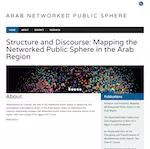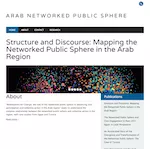
New series of reports highlights profound changes in online discourse in Arab countries
The Berkman Center is pleased to announce the publication of “Mobilization for Change,” a new series of reports examining the role of the networked public sphere in advancing civic participation and collective action in the Arab region. The online space in Egypt, Tunisia, and Bahrain reflects a growingly polarized and contentious offline political environment, with less consensus than existed five years ago. Fieldwork corroborates insights from social network mapping in this regard and confirms the continued importance of traditional political powerhouses as well as offline networks in mobilization. Yet digital media still offer a comparatively open venue for competing perspectives, providing more freedom for individual expression than traditional media in these countries.
The series includes three papers:
- “Structure and Discourse: Mapping the Networked Public Sphere in the Arab Region,” authored by Robert Faris, John Kelly, Helmi Noman, and Dalia Othman
- “The Networked Public Sphere and Civic Engagement in Post-2011 Egypt: A Local Perspective,” authored by Nagla Rizk with Lina Attalah and Nadine Weheba
- “An Accelerated Story of the Emergence and Transformation of the Networked Public Sphere: The Case of Tunisia,” authored by Escander Nagazi, Jazem Halioui, and Fares Mabrouk
The papers combine social network mapping techniques with fieldwork conducted in Egypt and Tunisia to analyze the shape and structure of the networked public sphere in the Arab region. The papers also examine the dynamics between the online and offline spheres and their relative impact on mobilization. The social network analysis is based on a regional map of the blogosphere; maps of Twitter networks in three countries: Egypt, Tunisia, and Bahrain; and a map of the Tunisian Facebook network. The fieldwork is based on in-depth interviews and focus groups with active members of the Egyptian and Tunisian networked public sphere in addition to nationally representative surveys. This mixed methods approach across these different platforms and regions offers a detailed view of social, cultural, religious, and political expression through digital media. Key observations include:
- The networked public sphere in the Arab region is much different than it was five years ago. With the decline in the blogosphere, Twitter and Facebook now host a large portion of the Arab networked public sphere.
- By all indications, the networked public sphere is more contentious, more highly polarized, and less conducive to broadly inclusive social mobilization, reflecting recent political shifts offline.
- In Egypt, the networked public sphere mirrors offline politics, including the presence and influence of traditional political powerhouses. On Twitter and Facebook, we see polarized debates that divide politically active users into three distinct and largely disconnected groups, in a close reflection of offline realities.
- In Bahrain, the antagonism between the government and opposition is manifest in a bipolar network structure on Twitter, and the debate is framed in sectarian language that appears intent on deepening the political divide.
- In Tunisia, we document the emergence of a flatter, less structured information system that allows individuals to contribute to the public sphere. The Twitter network is much more integrated and the discourse between political opponents less hostile, despite the political rivalries there.
- In each of these countries, the networked public sphere continues to offer a venue for civil society and individual voices that is less restrictive than traditional media.
Download Papers
The papers, along with two additional reports examining the project's methods and summarizing the results, are available at arabnps.org.
About Mobilization for Change
Mobilization for Change seeks to understand the complex relationship between the networked public sphere and collective action in the region, with case studies from Egypt and Tunisia. Mobilization for Change is a joint project of the Access to Knowledge for Development Center (A2K4D) at the School of Business at the American University in Cairo and the Berkman Center for Internet & Society at Harvard University. The project is supported by the International Development Research Centre (IDRC).
